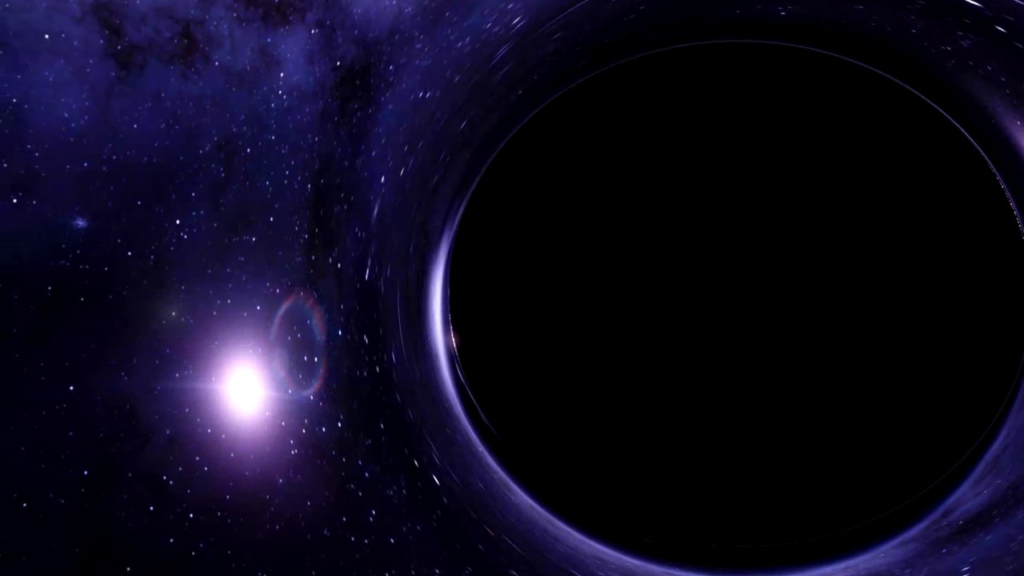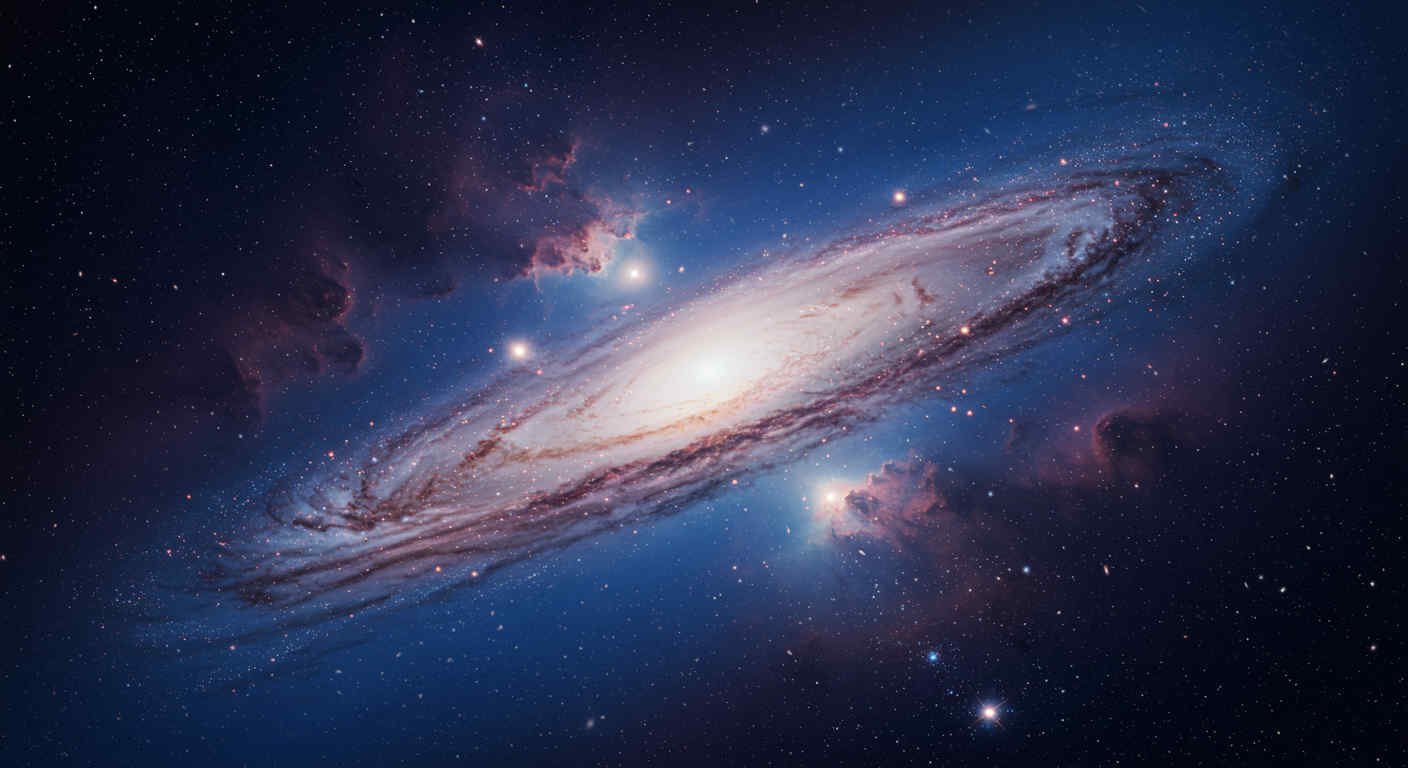Living Around a Black Hole: Can We Pull It Off?
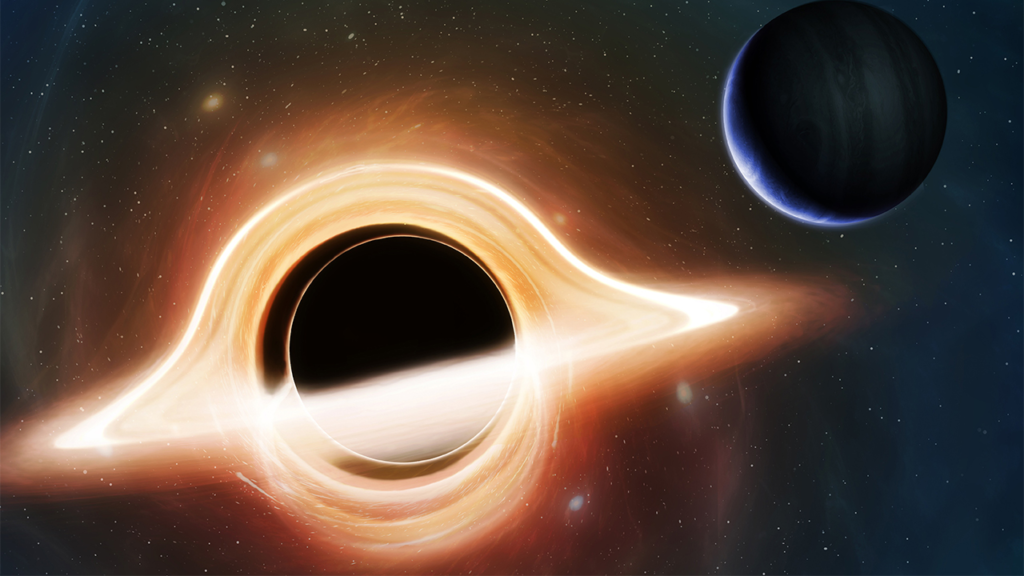
Table of Contents
Imagine the universe cashing out one day—kapow, lights out! The stars flicker off like fireflies at dawn, leaving a big, black hush where all the razzle-dazzle used to be. No more sunny days, no more starry nights—just a cold, empty goodbye. Yikes, right? It’s like the grandest show in town folding up its tent for good.
Even if we humans stick around forever, tough as old boots, we can’t dodge that final fade. But wait a sec—what if we sidestep the deep freeze by bunking up next to a black hole? Yep, those spooky space suckers that gobble up everything, even light itself. Could we really set up camp there? Well, hang tight, ‘cause we’re about to take a crazy spin through some wild ideas to figure it out.
The universe ain’t built to last—it’s like a wind-up toy slowing to a stop, or a big ol’ bonfire burning down to embers. Stars’ll burn out, taking every spark of our wild, colorful past with ‘em—every sunset, every comet tail, gone like smoke. It’s a heavy thought, heavier than a sack of bricks, but it’s where we’re headed unless we get real clever.
So, if we wanna keep the show on the road, we’ve gotta get crafty—real crafty, like black-hole-level crafty. In this tale, we’re gonna test a slew of plans to see if we can hang our hats near one of these cosmic critters. Fair warning: it’s a rollercoaster—full of flops, surprises, and a few “well, I’ll be!” moments. We’ll stumble, we’ll scramble, and maybe—just maybe—we’ll strike gold. Let’s rev up and see where this wild goose chase lands us.
Take One: A Plain Jane Start That Ices Over Quick

Alright, let’s start simple—like a peanut butter sandwich, no frills, just the basics. Picture a black hole, not one of those galaxy-chomping behemoths that swallow whole star systems for breakfast, but a smaller guy, just a few times beefier than our Sun. We’ll tag it a stellar black hole, ‘cause it’s what’s left when a star goes boom and fizzles out, leaving a dark little nugget behind. Now, throw in a planet circling it, a dead ringer for Earth—rocky, round, homey, the kind of place you’d picnic on if it weren’t so far out. At first, it’s like striking gold in a muddy creek.
If our Sun flipped into a black hole tomorrow—wham!—the planets wouldn’t bat an eye; they’d keep twirling like it’s business as usual. The Sun’d just scrunch down to a dot bigger than Mount Everest, ditching its shine but not its tug, still bossing the orbits around like a grumpy old landlord.
Sounds peachy, don’t it? No wild blasts shooting out, no nutty winds tearing things up—just a quiet black hole chilling like a wallflower at a dance. Even that brainy Hawking radiation, the slow drip that makes black holes shrink over a gazillion years, ain’t enough to rattle our little world. It’s so weak you’d need a microscope and a million lifetimes to notice it.
Everything’s smooth as gravy… ‘til it ain’t. A month later—bam!—our Earth-lookalike’s a ghost town. No folks, no critters, no nothing. Why? ‘Cause it’s colder than a witch’s broom out there—frostier than a freezer in a snowstorm! No star to warm it up, that planet’s a popsicle—too frosty to grow a dang thing, from carrots to daisies. Life as we know it? Toast, frozen solid, stiff as a board.
We dropped the ball here, big-time—fumbled it like a rookie at the Super Bowl. We were so busy scoping out the black hole, dodging its tricks, that we forgot the golden rule: a planet needs a heater, a big ol’ furnace in the sky. Earth’s got the Sun, beaming down like a cheerful neighbor; this sad sack’s got zilch but its own weak glow, and that’s like trying to heat a barn with a matchstick—or a whole dang town with a flickering candle.
It’s a bust—like moving into a shack with no stove in a blizzard, or betting your last dime on a horse that’s already lame. Alright, dust it off—we’ve got more shots in the locker. Let’s hit reset, chalk it up to a lesson learned, and give it another whirl before the chill sets in for good.
Take Two: Cranking the Heat with a Greedy Gobbler
Round one was a shiver-fest—too darn cold, left us shaking like leaves in a storm. Let’s turn up the dial for take two, get some sizzle going. Same setup: a stellar black hole, a few times the Sun’s weight, with an Earth-wannabe spinning ‘round it.
But this time, our black hole’s got a sidekick—a star it’s chowing down on, like a space shark tearing into a fish, jaws snapping and all. This duo’s an X-ray binary, ‘cause the black hole’s feast whips up a hot, glowing ring—an accretion disk that’s buzzing like a neon sign. That ring’s a toaster, blasting heat like a Fourth of July grill, and the star’s pitching in some extra sizzle, throwing sparks like a firecracker. Hot dog, we’re in business—time to cook up something good!
First peek, and it’s looking swell—better than a fresh-baked pie. The planet’s orbit’s a little loopy—not your tidy circle like Earth’s ‘round the Sun—but it’s holding steady, wobbling along like a kid on a bike, so we let it slide.
Down below, water’s glinting like a puddle after rain, green stuff’s sprouting—holy smokes, it’s alive! Temps are steamy, hotter than a dog day in August, the kind of heat that’d melt your flip-flops, but folks are rolling with it like pros, tough as nails. We’re high-fiving, whooping it up—finally, a black hole civilization that’s firing on all cylinders! Then—poof!—it’s gone, quicker than a hiccup in a hurricane. The whole planet’s vanished like smoke in the wind, leaving us scratching our heads.
What’s the scoop? That black hole’s a messy eater, burping out a gust of energy—think a cosmic fart that’d clear a room—and it smacks the planet like a freight train, scorching its air to a crisp, crackling like bacon on a skillet. The orbit goes cuckoo, zigzagging like a drunk mosquito, and—sluuuurp!—the black hole slurps it up, stretching it into space noodles longer than a country mile.
Days later, the star it’s munching explodes—boom!—‘cause the black hole hogged too much, like a greedy kid at a buffet. Even without the wind, that blast would’ve fried the planet to a cinder or kicked it outta dodge to freeze in the dark, drifting like a lost kite. It’s the three-body tango: three dancers tripping over each other, wild as a barnyard brawl with no referee. Stellar black holes? They’re loose cannons—too dicey for a home base, always ready to pull a fast one. Time to rethink this pickle—we’re two strikes down, but we ain’t out yet.
Take Three: Going Jumbo with a Ravenous Beast
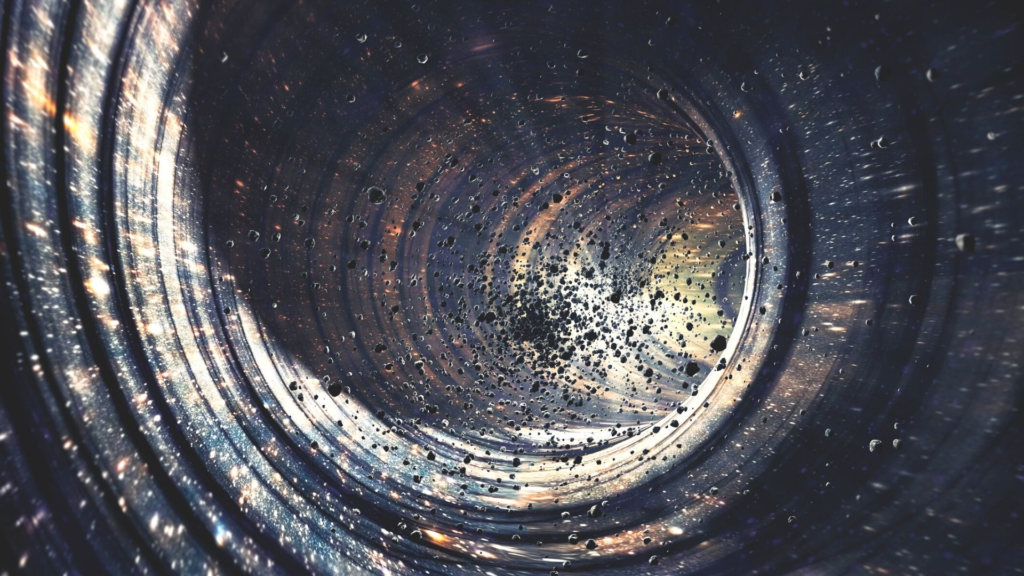
Okay, stellar black holes are a handful—too squirrely, like a cat on a hot tin roof or a bull in a china shop. Let’s go all-in for take three, swing for the fences. Imagine a supermassive black hole, millions of times chunkier than the Sun, lounging out in the boonies like a king on a throne.
To skip the ice age, we’ll say this one’s pigging out, scarfing down stuff like a kid with a candy stash, not even chewing—just gulping. That’s a quasar, y’all—a black hole so famished it glows brighter than a billion bonfires, lighting up the dark like a fireworks finale. We drop a planet in orbit, far enough to duck the fireworks—those bursts that’d knock your socks off—and hold our breath, hoping we’ve got a ringer this time.
Quasars are showstoppers—heck, stargazers once pegged ‘em as stars ‘til they clocked ‘em billions of light-years off, shining like heavenly spotlights on a cosmic stage. That accretion disk’s a blast furnace, spitting heat, X-rays, UV, and gamma rays—plenty of oomph to thaw a planet, melt the frost right off.
It’s like trading a candle for a blowtorch—sounds like a winner, huh? Nope, it’s a buzzsaw, a real humdinger. That energy’s a wild bull, charging in hot and heavy, snorting and stomping. The planet’s cooked faster than an egg on asphalt—air’s zapped, whooshing away like a popped balloon, surface’s a sizzling griddle hotter than a branding iron. Humans in that radiation storm? We’d be toast quicker than you can say “ouch,” fried to a crisp like fish at a fry.
We wanted a warm hug, a cozy nook; we got a raging dragon breathing fire down our necks. Quasars are too fierce, their dazzle a deadly dagger sharper than a razor’s edge. A black hole civilization here? It’d be flatter than a flapjack under a truck, squashed like a bug on a windshield. We’re grasping at straws now—supermassive’s cool, but we gotta cool its jets, tame that beast before it roars us outta the game. Back to square one, licking our wounds, but we’ve got grit—let’s keep plugging away.
Take Four: A Mellow Monster with a Hollywood Hook
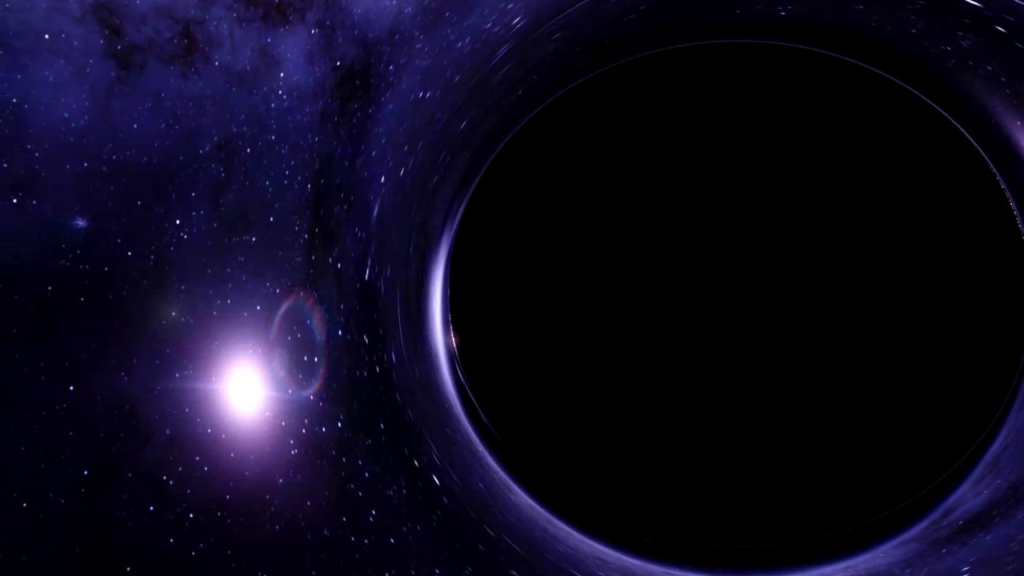
Fourth try’s gotta be it, right? We’re not waving the white flag yet. We’re sticking with a supermassive black hole, but this one’s laid-back—no big feasts here, just sipping slow and steady. Think M87*, that famous hole we snapped a pic of, or Gargantua from Interstellar, looming like a quiet giant in the shadows.
That movie’s our spark—Nobel champ Kip Thorne helped shape it, so it’s got some real juice, not just Hollywood fluff. We’re chasing a habitable zone, that just-right spot where water flows and life’s got a prayer, like Goldilocks picking the perfect porridge. Picture a planet circling this sleepy titan, far enough to sidestep the odd energy burp—little hiccups that’d barely ruffle your hair—but near enough to bask in the faint glow of its quiet accretion disk, a soft shimmer in the void.
At first, it’s smooth as silk, gliding like a swan on a pond. The disk’s a gentle lantern, warming the planet like a lazy porch light on a summer eve. Temps hold steady—no ups, no downs, just a comfy hum that wraps you like a blanket.
Sure, day and night are outta the picture—light’s twisting ‘round the hole like a carnival mirror, bending and bouncing—but it’s doable, yeah? Folks are hanging tough, tweaking life in this odd, endless glow, tougher than a pack of mules. We’re grinning like fools—finally, a black hole civilization that’s not a dumpster fire, a real contender! Then, the wheels start wobbling, creaking like an old wagon.
Food’s a headache—plants won’t sprout right without a light buffet, drooping like laundry on a rainy day. People droop too, sick as dogs all the time, wilting like daisies in a drought. Kids stop showing up, birth rates plummeting faster than a rock off a cliff, and—whoosh!—it all falls apart, crumbling like a stale cookie. What’s the hitch? Life’s a finicky critter—it needs a smorgasbord of rays, not one flavor on repeat.
The Sun’s a master chef, dishing out visible light, UV, and more, whipping up life’s ingredients with a flourish. This hole’s disk? It’s a one-trick pony, serving a single note, flat as a pancake. The planet’s a warm tomb, not a bustling town—a hollow shell whispering of what could’ve been. We were inches from glory, only to trip over a shadow, snatching defeat from the jaws of victory.
Take Five: Starry Sidekicks to the Rescue
We ain’t throwing in the towel—let’s tweak it for take five, keep the dream alive. Same supermassive black hole, not too peckish, just nibbling on a modest accretion disk like a picky eater at a potluck. But here’s the zinger: we’re tossing in a gang of stars, big and bright, orbiting alongside our planet like a posse riding into town. Brilliant, huh?
Last go-round, we missed the light mix—plants and folks starved for variety; now, these suns’ll sprinkle in the zesty rays we need, a cosmic spice rack. Supermassive holes with star pals ain’t oddballs—think galaxy hubs with twinkly crowns, swirling like a merry-go-round. The planet’s sky’d be a fireworks show, a quilt of colors that’d make Earth’s night look like a dim bulb in a dusty shed.
We’re pumped—conditions are spot-on: warm, safe, and lit up like a Vegas strip on New Year’s Eve. Civilization’s chugging, growing grub, splashing in water, full of zip—bouncing like a kid on a trampoline. It’s a bustling hive, humming with hope. Then we glance up—good gravy, it’s blinding! Picture a thousand suns blazing down, a glare so fierce you’d fry your peepers just stepping out, hotter than a jalapeño in a microwave.
Hiding inside? No dice—those stars are pumping neutrinos, sneaky little zingers zipping through walls like ghosts through a haunted house. Here, they’re harmless flies, buzzing by; there, they’re a hornet’s nest, stinging your insides, scrambling the air, and turning life into a hot mess, a bubbling stew of chaos.
It’s a gut punch—we patched one hole and fell into a blender, whirring like a tornado in a trailer park. The planet’s a skillet, civilization’s sizzling like bacon, popping and spitting. We dodged the chill just to roast—talk about jumping outta the frying pan into the fire! So near, yet so roasted, a bitter twist that’d make you shake your fist at the sky. One last crack—can we dodge this frying pan, or are we cooked for good?
Final Swing: A Solo Hole with a Space-Time Twist
Here we are, down to the wire, last roll of the dice. We’re picking a supermassive black hole, lonesome as a tumbleweed rolling through a ghost town—no stars, no big munching, just a quiet hulk drifting in the void, brooding like an old hermit. Hawking radiation’s a murmur, too soft to stir a leaf, faint as a whisper in a storm. Sounds like a dud, don’t it? No juice, no warmth—didn’t we flop like this way back when? Hold your horses, ‘cause this one’s got a sneaky trick up its sleeve, cribbed from Interstellar’s bag of goodies, a curveball that’d make your jaw drop.
Near a black hole, time gets funky—hours down low stretch into years up high, twisting like a rubber band pulled tight. That’s time dilation, a real head-scratcher we’ve clocked even here, ticking slower for jets than folks on the ground. But here’s the clincher: it twists light, too, bending it like a pretzel.
Picture a signal pinging every second from way out; down by the hole, it’s a rat-a-tat-tat—60,000 hits a second, chattering like a machine gun. Low hums turn into high-pitched screams, packing heat hotter than a stove. Now, the universe’s got this faint buzz, a Big Bang echo called cosmic background radiation (CMB), a leftover hum from when it all kicked off. Up top, it’s a measly 2 Kelvin—minus 271°C, a whisper we snag with big scopes, colder than a penguin’s flipper.
But nestle a planet near this hole, and that CMB gets a jolt, a zap that’d wake a hibernating bear. It warps into Sun-like rays, washing the planet in a golden hug, glowing like a lantern in the fog. Hot dang—we’ve got warmth, water, life! No wild gusts, no star bombs—just a steady cosmic glow, steady as a heartbeat.
Civilization’s buzzing, building a black hole civilization tougher than a two-dollar steak, a scrappy bunch digging in deep. Sure, night’s a no-show—light’s everywhere, like a noon that won’t quit, bathing the world in an endless shine. Seasons? Zilch, it’s an endless picnic, same vibe all over, lazy and warm as a Sunday nap. Years don’t mean beans—no dark skies, just a bright shawl with a black hole blot as the only riddle, a dark eye staring back.
It’s a quirky haven, a pit stop in the storm, a flickering flame against the cold. The CMB’ll fade as the universe cools—give it ages, and the fire’ll dim, winking out like a tired campfire. Something might bump the hole someday, too—a stray rock or a wandering star shaking things up. But for now, it’s a lifeline, a weird little roost where we could dig in, tougher than an old oak.
Snagging one’s a long shot—like finding a dime in a desert or a four-leaf clover in a football field—but the universe is a sprawling ranch, big as all get-out, and the odds ain’t dead. It’s a glimmer, a whisper of hope in a sea of dark—a chance to thumb our noses at the end and keep on trucking.
Tying It Up: A Hard-Earned Nugget
So, can we live around a black hole? You bet, if we’re fussier than a cat with a new collar, pickier than a kid at a veggie buffet. It’s a tight squeeze—stellar holes are too feisty, bucking like broncos; quasars are flamethrowers, roaring like dragons; starry skies are zappers, buzzing like a live Roswell’d kill me for that, but I reckon I’ll keep going—sorry, folks, I got cut off there for a sec—stellar black holes are too wild, quasars too fierce, starry skies too zappy—supermassive with a CMB twist?
That’s our golden goose, a faint flicker in the big dark. Science climate change might shove us there someday, see, when the heat’s on and Earth’s frying—technology climate solutions like this could be our ace in the hole. Sustainable technology’s the ticket—bending rules, twisting time, making miracles feel like Monday morning.
But let’s not kid ourselves—it’s a humbler, a cold splash in the face. No matter how slick we get, we’re minnows in a mighty sea, ducking the endgame with all we’ve got. The universe’ll wind down, slow as molasses, and even a black hole’s just a breather, a timeout in the cosmic clock. Still, dang if it ain’t a hoot to dream—us scrappy humans thumbing our noses at the void, carving a nook where the abyss rules, a speck of grit in the big nowhere. That’s the spirit: gritty, gutsy, reaching for the stars—or the holes they leave behind, dark as a devil’s heart but ours for the taking, if we’ve got the moxie.
See this good video on YouTube: https://www.youtube.com/watch?v=TnIKQ4YBnjg
See this another goog article in our blog: https://techforgewave.com/science-is-tackling-climate-with-edge-tech/
